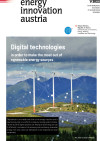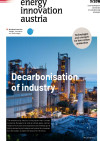Suchergebnisse für "Factsheet: Energietechnologien gestalten, die für alle sinnvoll und nutzbar sind"
Intelligent and green? User centred scenarios for information technology use in sustainable buildings

The project asked for the contribution of information technology use to the environmental performance of buildings - in terms of the vision of designers, practical use in existing projects and expectations of potential users.
Themen
New4Old - New energies for old buildings
The project "New4Old - New energy for old buildings - Promoting the integration of RES & RUE measures in historic buildings" aims to promote the integration of renewable energy and energy efficiency technologies into historic buildings, and to create a European-wide network of Renewable Energy Houses in the different Member States of the European Union.
Urbane GmbA - Urban potential of greenable area in the obscured stock
Urbane GmbA aims to explore and assess the potential of greenable area from building and obscured stock (vertical and horizontal areas) in Vienna, to apply currently available survey instruments and to show research and development needs.
Digital technologies

Digital technologies in order to make the most out of renewable energy sources.
energy innovation austria
1/2022
Herausgeber: BMK in cooperation with the Climate and Energy Fund
Englisch, 12 Seiten
Downloads zur Publikation
Living and Working in the Moosburg, the "community of education"
The design aims not only at creating comfortable living spaces and practical work environments, but at connecting these realms, thus providing a holistically attractive “living space”. A pilot project will be built on an appropriate site in the very core of Moosburg, neighbouring both the village square and the educational campus.
Oekosan'11 - International symposium for high-quality retrofit of large-volume buildings to plus-energy-buildings
The AEE INTEC organized the international congress "ökosan'11 - high-quality retrofit of large-volume buildings to plus-energy-buildings" in September 2011. The position of Austrian companies in international cooperation was strengthened through personal contacts during the conference.
SmartCity Baumgarten - Demonstration of an anergy network and implementation of climate-friendly solutions in existing districts
Implementation of a cross-property anergy network for the supply of heating, cooling and electricity in an existing neighbourhood. With this demonstration project, a technical-legal alternative for areas outside of district heating supply is developed, which makes it possible for neighbourhoods to join together to use renewable energies in common.
GREeNvaluation - Real-time monitoring and performance evaluation
The aim of the project was the development of the GREeNvaluation toolkit, as a precursor to the implementation of green and liveable cities. The visualization and accounting (cost / benefit) of green infrastructure services makes the benefits more tangible and understandable. The GREeNvaluation toolkit aims to create awareness far beyond the target areas by means of target group-specific communication formats.
GREENsChOOLENERGY - Development and practical implementation of sustainable solutions for urban hotspots in combination with greening / PV / water
Use of the synergetic effects in the construction of photovoltaic, greening and irrigation systems at the location of HTL1 Klagenfurt Lastenstraße, to optimize the yield of experimental photovoltaic elements and at the same time reduce urban heat islands.
IEA FBC Implementing Agreement Fluidized Bed Conversion (working period 2009 - 2013)
Overview of the current status of the fluidized bed technology worldwide in regards to energy technology.
IEA PVPS Task 12: Photovoltaics (PV) Sustainability Activities (working period 2024 - 2027)
Photovoltaics (PV) is a renewable energy source that is an important technology for the energy transition. For this reason, or rather despite this, it is important to consider sustainability aspects in PV as well. End-of-life solutions in particular play an important role, as a strong increase in the number of end-of-life modules is expected in the coming years. Well-functioning recycling methods, repair possibilities or reuse options are of great importance. In this project, these existing methods and capacities in Austria are being researched and published in reports and workshops.
Gründerzeit with future - demonstration project 1: David´s Corner
High value energy efficient refurbishment of an ensemble of three neighbouring Wilhelminian style buildings in a non-lucrative location.
CombiSol: solar combisystems for houses, state-of-the-art and potentials for improvements
Evaluation of the quality and efficiency of state-of-the-art installed solar combisystems, potentials for improvements and measures to increase the quality
ESSBAR – Edible balcony gardens for retrofit – Vertical Greening Technologies for the City
Demonstration of an affordable, resource-saving and innovative balcony system with integrated edible vertical gardens and rainwater management. Considering the needs of residents for green outdoor spaces and the active participation of residents are an important part of the project.
PersonAI - User-Centered AI-based energy services built on personal preference models
Conduct a large-scale, long-term study with 40-50 people to create personal comfort profiles to increase comfort in buildings. The personal comfort profiles will then be fed back into the building control system as input variables in a proof-of-concept.
Development of modular parts for clay-passive houses

Development of extensive storey-high modular parts made of renewable primary products (wood, straw, hemp) for clay-passive houses.
Vilipa - Visible light based Person and Group Detection in existing buildings
Evaluation of the technical and economic feasibility of an occupancy detection system based on the technology of visible light sensing, which, in combination with the building management system, should reduce the energy consumption of buildings. The goal is to implement low-tech/low-complexity solutions that can distinguish between individuals and groups based solely on the detection of visible light reflections.
OPENing Re-Use – Optimal planning decisions in the re-use sector
In an operational context, companies in the circular economy are faced daily with the question of whether a used product should be repaired, remanufactured, refurbished or recycled. The decision on what to do with used products is fraught with a great deal of uncertainty and must be made on a case-by-case basis - product-individually and depending on factors such as brand, condition, age, demand or recycling possibilities. As part of the "OPENing Re-Use" project, a business planning tool is being developed to support companies in their re-use planning, thereby increasing the efficiency of re-use processes and making re-use activities even more competitive with the purchase of new products.
Decarbonisation of industry

Ways to achieve a zero-emission industry. Innovation is the key for climate-friendly production.
energy innovation austria
3/2019
Herausgeber: BMVIT und Klima- und Energiefonds
Englisch, 12 Seiten
